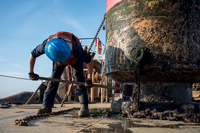 Maritime construction is a niche field within the construction industry. Most of the people who work in this area of construction will specialize in it, and they’ll carry the requisite special qualifications, training and licensing to prove it. Jobs like underwater welding are very different from welding in the dry environment of a workshop or an above-ground job-site. As such, the insurance demands for maritime construction is very different as well.
Maritime construction is a niche field within the construction industry. Most of the people who work in this area of construction will specialize in it, and they’ll carry the requisite special qualifications, training and licensing to prove it. Jobs like underwater welding are very different from welding in the dry environment of a workshop or an above-ground job-site. As such, the insurance demands for maritime construction is very different as well.
Waterborne Equipment
Many insurance policies actually feature an exclusion on this note. If you take your equipment out on the open water and something should happen to it, your basic policy is probably not going to cover the loss.
Watercraft Liability
Whether you’re getting to the jobsite on a speedboat or a rubber raft, watercraft liability will be a requisite if you’re doing any maritime construction. Any damage in which your vessel might be implicated, you’ll want liability for it.
Marine Floater
“Floater” sort of takes on a double meaning here: Any installation you’re building in order to work on a project, you’ll need some coverage for it. On land this could mean a scaffolding, on the sea it might mean temporary constructs that allow your team access to the exterior of the project without having to swim to get there.
Adverse Weather
Choppy weather is to be expected on the sea, but it can turn bad in ways that can cost you weeks worth of work. Storms, the shifting of the tides and simple bad sailing conditions can set your schedule back quite a bit. Insurance to protect you from adverse weather conditions is doubly important on sea as on land.
Knock for Knock
A common insurance agreement in offshore construction is the “Knock for Knock” arrangement. What this means is that all parties involved will cover their own ends, even if it could be proven that another party was at fault. You see Knock for Knock used in all sorts of construction projects, but it is especially popular in marine construction. Many deals are made with this agreement on smaller projects simply because there are so many additional angles to cover on the sea, and this simplifies the process a bit.
Maritime construction insurance is one of the reasons that this is a specialty field. This, along with the special training, equipment and materials required. If you ever want to explore that niche, the investment of time, money and energy to get started may prove to be well worth it, of course. It’s easier to dominate a niche than it is to dominate an entire industry.





